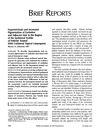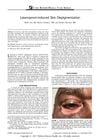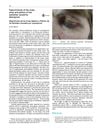TLDR Using topical prostaglandin F2α for glaucoma may cause loss of eyelash or eyebrow pigment.
In a case series from 2004, seven patients who were treated with topical prostaglandin F2α (PGF2α) analogs for primary open-angle glaucoma developed bilateral poliosis, which is the loss of pigment in eyelashes and/or eyebrows. This side effect occurred either alone or in combination with other adverse effects associated with PGF2α analog therapy. The study concluded that poliosis should be considered a possible adverse effect of topical PGF2α analog therapy, a connection that had not been reported prior to this study. Consequently, the use of topical PGF2α analogs should be considered when diagnosing patients with poliosis.
 162 citations
,
August 2002 in “Survey of Ophthalmology”
162 citations
,
August 2002 in “Survey of Ophthalmology” Latanoprost can make eyelashes longer, thicker, and darker.
 216 citations
,
October 1997 in “American Journal of Ophthalmology”
216 citations
,
October 1997 in “American Journal of Ophthalmology” Using the eye pressure medication latanoprost can cause excessive hair growth and darker eyelashes on the treated eye.
31 citations
,
October 1992 in “Journal of Clinical Pharmacy and Therapeutics” Some medications can change hair color, especially chloroquine and cancer treatments.
69 citations
,
April 2010 in “Clinical ophthalmology” Bimatoprost is effective for growing longer, thicker, and darker eyelashes.
 7 citations
,
July 2011 in “Survey of Ophthalmology”
7 citations
,
July 2011 in “Survey of Ophthalmology” The document concludes that periocular hair disorders have various causes and treatments, and proper evaluation by specialists is important for management and prognosis.
 27 citations
,
July 2018 in “Journal of optometry”
27 citations
,
July 2018 in “Journal of optometry” Eyelashes protect the eyes, but more research is needed to understand how.
 9 citations
,
November 2017 in “Journal of Glaucoma”
9 citations
,
November 2017 in “Journal of Glaucoma” Latanoprost eye drops may cause skin depigmentation.
 1 citations
,
January 2015 in “Actas dermo-sifiliográficas/Actas dermo-sifiliográficas”
1 citations
,
January 2015 in “Actas dermo-sifiliográficas/Actas dermo-sifiliográficas” Latanoprost eye drops caused excessive cheek hair growth and eyelash whitening in a woman.





